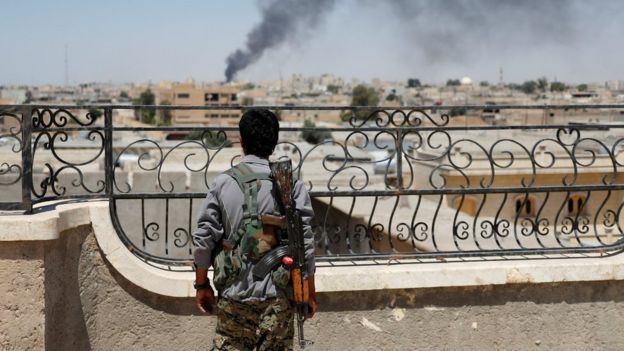Raqqa: The desperate fight for Islamic State group's 'capital'
This has been a long and brutal road. Driving through the suburbs of Raqqa towards the centre, we pass collapsed buildings, hit by American air strikes, and pockmarked shop fronts, caught between the advance of the SDF and the retreating fighters who call themselves Islamic State (IS).
As the SDF push forward, carts emerge, piled high with people and belongings, flying white flags. Some of these families sought refuge in Raqqa from other battles in Syria's long war, only to find themselves now back at the centre of the fighting.
Others are emerging from years inside a living nightmare.
"They slaughtered us," says one man, a local house painter. "They told us we were unbelievers, even though we are Muslims from birth, fasting and praying."
There are still tens of thousands of people inside Raqqa, hostages to a regime that has been killing anyone who tries to leave. "We pray that God will have revenge against Islamic State," a woman says, clutching a small child. "Everything that's happened to us is because of them."
The SDF made rapid advances through the outskirts of the city earlier this month, their progress eased by US air strikes and artillery.
That bombardment continues: every so often the dull thud of a falling shell is followed by a cloud of dust over the centre of the city.
- A rare glimpse inside Raqqa
- Life inside 'Islamic State'
- Has IS's leader been killed?
- Trump and the battle for eastern Syria
But now that SDF forces have reached the edge of the old city, the advance has slowed. IS fighters are hemmed in inside these narrow streets.
Bombed from the air and surrounded on three sides, they are fighting back, with all the means at their disposal.
We drive closer towards the centre. A sound overhead signals the presence of an IS drone: a small, remote-controlled helicopter that can drop a hand grenade, unseen, from the sky.
On the top floor of a building overlooking the old city, a group of SDF fighters suddenly comes under fire.
"Sniper, sniper…" someone shouts.
A woman in camouflage fatigues lies face-down on the ground and loads a heavy-calibre sniper rifle, loosing off rounds in the direction of the IS fire.
From nurse to fighter
Among the Kurds, men and women fight alongside one another. The sniper's name is Delilah. She is 22 years old, and was studying to become a nurse. But it is here, on the front lines, that she seems to have found her true calling.
"When I hit my target and I kill the enemy I become very happy," she says, laughing in between bursts of heavy gunfire. "It boosts our morale and our power. We are protecting our friends and our people."
Returning from the front, exhausted fighters describe intense, all-night battles, as so-called Islamic State uses its network of tunnels to stage sneak attacks behind the SDF lines.
"They surrounded us. They were shooting from every side," says an Arab fighter who calls himself Mashuk. "They caught one of us, they took him hostage. But we managed to get him back."
IS weaponising fear
Drones, tunnels, suicide bombs, snipers: even in war, IS has weaponised fear. It has done this perhaps more successfully than any other group. The battle for Raqqa will be a long, hard fight. If IS loses its capital, it will surely mean the eventual end of the caliphate.
But then what? Will the IS ideology die along with it? Probably not. It certainly won't be the end of Syria's long war, or the violence it has spawned around the world.

[BBC SOURCES]


No comments